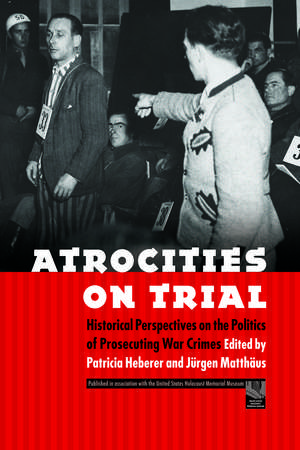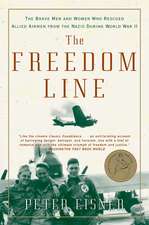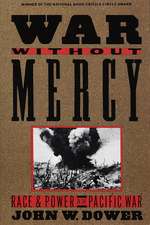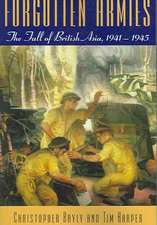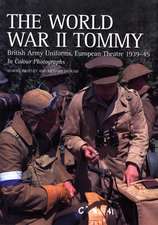Atrocities on Trial: Historical Perspectives on the Politics of Prosecuting War Crimes
Editat de Patricia Heberer, Jurgen Matthausen Limba Engleză Paperback – 31 mar 2008
Since the Nuremberg trials following World War II, there has been considerable debate about the nature and effects of war crimes with regard both to the Nazis and to modern-day perpetrators. What constitutes a “war crime,” and how has the concept changed over time? How do victors and vanquished deal with crimes that have universal as well as national dimensions? How is the historical reality of war crimes related to their judicial treatment? How are perpetrators portrayed during investigations and trials?
These timely and provocative essays make use of newly available archival sources and a wide range of case studies to provide in-depth analyses of war crimes within a broad historical framework. The essays are organized into four sections: the history of war-crime trials from Weimar Germany to just after World War II; the sometimes diverging Allied efforts to come to terms with the Nazi concentration camp system; the ability of postwar society to confront war crimes of the past; and the legacy of war-crime trials in the twenty-first century. Atrocities on Trial illuminates a dark and timely subject and helps us to understand the ongoing struggle to hold accountable those who perpetrate crimes against humanity.
Preț: 252.84 lei
Nou
Puncte Express: 379
Preț estimativ în valută:
48.40€ • 52.59$ • 40.68£
48.40€ • 52.59$ • 40.68£
Carte tipărită la comandă
Livrare economică 21 aprilie-05 mai
Preluare comenzi: 021 569.72.76
Specificații
ISBN-13: 9780803210844
ISBN-10: 0803210841
Pagini: 360
Ilustrații: 5 tables
Dimensiuni: 152 x 229 x 22 mm
Greutate: 0.48 kg
Editura: Nebraska Paperback
Colecția University of Nebraska Press
Locul publicării:United States
ISBN-10: 0803210841
Pagini: 360
Ilustrații: 5 tables
Dimensiuni: 152 x 229 x 22 mm
Greutate: 0.48 kg
Editura: Nebraska Paperback
Colecția University of Nebraska Press
Locul publicării:United States
Notă biografică
Patricia Heberer is a historian with the Center for Advanced Holocaust Studies at the United States Holocaust Memorial Museum. She is the museum’s in-house specialist on medical crimes and eugenics policies in Nazi Germany.
Jürgen Matthäus is the director for applied research at the Center for Advanced Holocaust Studies at the United States Holocaust Memorial Museum. He is the coeditor of Contemporary Responses to the Holocaust and a contributor to Christopher R. Browning’s The Origins of the Final Solution: The Evolution of Nazi Jewish Policy, September 1939–March 1942 (Nebraska 2004).
Contributors include: Donald Bloxham, Jonathan Friedman, Richard J. Golsan, Patricia Heberer, Michael R. Marrus, Jürgen Matthäus, John K. Roth, Ulf Schmidt, Rebecca Wittmann, and Lisa Yavnai.
Cuprins
Foreword by Michael R. Marrus
Introduction: War Crimes Trials and the Historian
Part I. Precedents in Punishment
The Lessons of Leipzig: Punishing German War Criminals after the First World War (Jürgen Matthäus)
Early Post-War Justice in the American Zone: The “Hadamar Murder Factory” Trial (Patricia Heberer)US Army War Crimes Trials in Germany, 1945-1947 (Lisa Yavnai)
Part II. Allied Courts and German Crimes in the Context of Nuremberg
Law and Politics in the Subsequent Nuremberg Trials, 1946-1949 (Jonathan Friedman)
The Nuremberg Doctors’ Trial and the Limitations of Context (Michael R. Marrus)
“The Scars of Ravensbrück”: Medical Experiments and British War Crimes Policy, 1945-1950 (Ulf Schmidt)The Sachsenhausen Trials: War Crimes Prosecution in the Soviet Occupation Zone and in West and East Germany (Jonathan Friedman)
Part III. Postwar Society and the Nazi Past
“No Ordinary Criminal”: Georg Heuser, Other Mass Murderers, and West German Justice (Jürgen Matthäus)
Tainted Law: The West German Judiciary and the Prosecution of Nazi War Criminals (Rebecca Wittmann)
Justice in Austrian Courts? The Case of Josef W. and Austria’s Difficult Relationship with Its Past (Patricia Heberer)
Part IV. Current Aspects and Implications
Crimes against Humanity Trials in France and their Historical and Legal Contexts: A Retrospective Look (Richard J. Golsan)
Milestones and Mythologies: The Impact of Nuremberg (Donald Bloxham)
Prosecution, Condemnation, and Punishment: Ethical Implications of Atrocities on Trial (John K. Roth)
Bibliography
Contributors
Index
Introduction: War Crimes Trials and the Historian
Part I. Precedents in Punishment
The Lessons of Leipzig: Punishing German War Criminals after the First World War (Jürgen Matthäus)
Early Post-War Justice in the American Zone: The “Hadamar Murder Factory” Trial (Patricia Heberer)US Army War Crimes Trials in Germany, 1945-1947 (Lisa Yavnai)
Part II. Allied Courts and German Crimes in the Context of Nuremberg
Law and Politics in the Subsequent Nuremberg Trials, 1946-1949 (Jonathan Friedman)
The Nuremberg Doctors’ Trial and the Limitations of Context (Michael R. Marrus)
“The Scars of Ravensbrück”: Medical Experiments and British War Crimes Policy, 1945-1950 (Ulf Schmidt)The Sachsenhausen Trials: War Crimes Prosecution in the Soviet Occupation Zone and in West and East Germany (Jonathan Friedman)
Part III. Postwar Society and the Nazi Past
“No Ordinary Criminal”: Georg Heuser, Other Mass Murderers, and West German Justice (Jürgen Matthäus)
Tainted Law: The West German Judiciary and the Prosecution of Nazi War Criminals (Rebecca Wittmann)
Justice in Austrian Courts? The Case of Josef W. and Austria’s Difficult Relationship with Its Past (Patricia Heberer)
Part IV. Current Aspects and Implications
Crimes against Humanity Trials in France and their Historical and Legal Contexts: A Retrospective Look (Richard J. Golsan)
Milestones and Mythologies: The Impact of Nuremberg (Donald Bloxham)
Prosecution, Condemnation, and Punishment: Ethical Implications of Atrocities on Trial (John K. Roth)
Bibliography
Contributors
Index
Recenzii
“[Atrocities on Trial] leads to counter-intuitive and otherwise surprising conclusions in several areas which make it a significant contribution to the existing literature. . . . Well-written . . . balancing a lively if depressing story with a first-rate intellectual analysis [and] first-tier scholarship.”—Michael Livingston, professor at Rutgers School of Law–Camden
“A compelling collection of informative and thought-provoking essays. . . . Historical lessons emerge best from the kind of stimulating explorations that fill this volume. It is an edited volume at its best: not a hodge-podge, but essays that complement each other, reflect off each other, and also create friction, setting off sparks that are consistently illuminating.”—Douglas G. Morris, New York Law Journal
"This book fills a significant void in the more widely known war crimes literature that focuses on wartime atrocities committed by Hitler's Third Reich."—J. C. Watkins Jr., CHOICE
"These essays make use of newly available archival sources and a wide range of case studies to provide in-depth analyses of war crimes within a broad historical framework."—Shofar
"[Atrocities on Trial] is an informative, nuanced, and balanced anthology that succeeds in its ambition to clarify the history of Nazi war crimes prosecution and the omnipresent influence of political forces on the trials."—Michael S. Bryant, Holocaust and Genocide Studies
